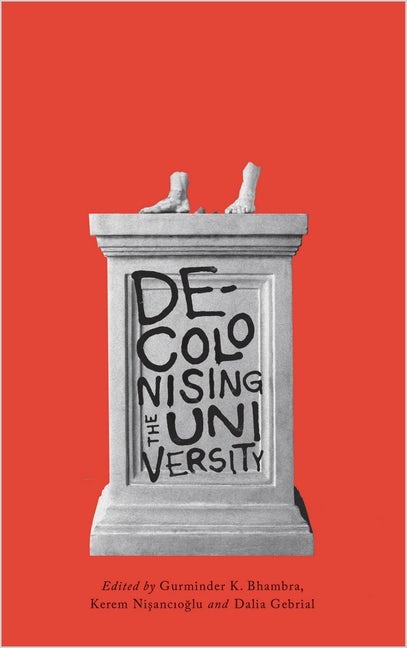
This article is a preview from the Winter 2018 edition of New Humanist
Decolonising the University (Pluto Press) by Gurminder K. Bhambra, Kerem Nişancıoğlu and Dalia Gebrial (eds)
For the first two and a half centuries of its 300-year existence, the British state bestrode an empire: a vast system of violent exploitation, sustained by an advanced sense of racial or cultural superiority. Notwithstanding the horrors of transatlantic slavery and millions of deaths from famine in India, 49 per cent of the British public believe that colonised peoples benefited from imperial rule, according to a 2014 YouGov poll. These deep, unexamined assumptions – direct offspring of earlier imperial mentalities – remain a profound force in British society, politics and foreign relations, not least in the place where they first originated: the elite intellectual culture. This collection of essays introduces us to the movement of academics, students and activists that has emerged to challenge that legacy.
The UK higher education sector advertises the diversity of its student body with enthusiasm, but that diversity does not extend to academic staff, where black and minority ethnic people are severely underrepresented. This, together with the ways in which many subject areas developed through the days of empire and their aftermath, has an influence on modern scholarly output.
In my own field, international relations, much analysis is written from the point of view of western power centres. In this and other disciplines, the protagonists of the human story are often taken to be western thinkers and political actors, consistent with the imperial narrative. This lacks credibility in the eyes of many students, who might ask, in the words of a recent NUS campaign, “why is my curriculum white?”
In one chapter, Dalia Gebrial, a participant in the Oxford “Rhodes Must Fall” campaign, notes that while the activists’ efforts focused on colonial iconography, the curriculum and the lack of representation, the elite backlash focused exclusively on the demand to bring down a statue in Oriel College of the British imperialist Cecil Rhodes. Instead of responding seriously, newspapers and even senior academics shoehorned it into a pre-existing moral panic. Supposed “snowflake” students wanted to spare their feelings from the “offence” caused by a statue.
As Gebrial points out, this “was the precise opposite of what the students set out to achieve: the goal was never to ‘no-platform’ or ‘erase’ Rhodes – it was to platform the coloniality he represented and its lasting impact in seminars, university lectures and public discourse, subjecting it to the critical scrutiny it had thus far eluded.” In reality, the activists had demonstrated a genuine commitment to free discussion in search of truth, and the British elite was attempting to shut down a discomfiting argument.
The book brings together an impressive array of voices from academia and activism, describing efforts to challenge the colonial legacy in higher education, in the hope that successes will have positive knock-on effects on wider society. We learn of the surreptitious opening of university spaces in the Netherlands to refugees and asylum seekers. We see how student activism led the University of Amsterdam to accept the decolonial challenge. And we hear the inspiring story of how Britain’s first and only Black Studies programme was set up at Birmingham City University.
In the current climate, it is urgent to confront the roots of racism. The challenge is being taken up vigorously at academia’s grassroots. Whether the intellectual establishment is capable of a serious response is another matter.
David Wearing is the author of "AngloArabia: Why Gulf Wealth Matters to Britain" (Polity)

